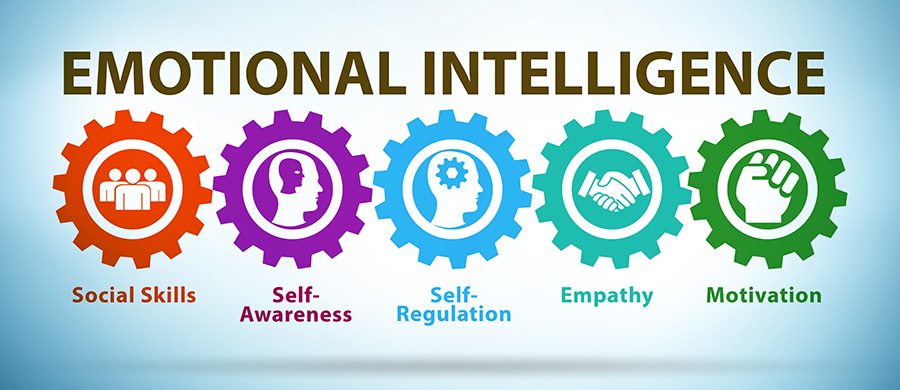There’s no doubt that emotions play a huge role in our lives. Although we are taught from a young age to make decisions using our minds, the influence of our hearts cannot be underestimated. In fact, many of our intentions and agendas are largely driven by our feelings and emotions. Because of this, it’s important to understand how our emotions work and learn to use them in constructive ways. This is where emotional intelligence comes in.
What Is Emotional Intelligence?
Emotional intelligence is a person’s ability to identify and understand their own emotions, as well as the emotions of others around them. It’s a crucial skill for success in both personal and professional life. In the workplace, emotional intelligence can help you:
- Build stronger relationships with your colleagues and clients
- Resolve conflict more effectively
- Manage stress more effectively
- Motivate and inspire others
- Make better decisions
- Achieve your goals
There are many ways to boost your emotional intelligence. Here are a few tips:
1) Develop Self-Awareness
If you want to build your emotional intelligence, you need to start with yourself. As they tell you on an airplane, in times of emergency, you need to wear your own oxygen mask first before you can help your fellow passengers. So, what can you do to enhance your emotional awareness? Well, this requires some time and effort. So buckle up!
The first thing you need to do is develop a habit to sit with yourself in silence every day for at least 15-30 minutes. During this time, reflect on your emotional-behavioral patterns. Think about how you tend to react in various situations. Think about your emotional triggers and the ensuing impulsive behaviors. It’s important to be completely honest with yourself because that’s the only way you can truly become aware of your emotions and their effects on your life.
2) Practice Active Listening
Bernard Baruch once said, “Most of the successful people I’ve known are the ones who do more listening than talking.” If you want to understand someone, all you need to do is listen to them. Make it a habit that when someone talks to you, you pay your utmost and undivided attention to every word they speak. Don’t just hear – listen.
Gradually, this habit will help you understand the emotions of the other person. You will start observing the subtle changes in their tone, body language, facial expression, and gestures. Plus, when you are an active listener, especially as a leader, people trust you more. They will feel more comfortable sharing how they really feel and what’s bothering them. This helps create strong relationships and a healthy work environment.
3) Practice Empathy
Empathy is the ability to understand, relate to, and share the feelings of other people. As a healthcare leader, showing empathy is crucial for creating a positive and supportive work environment. Not only does it help you build strong bonds with your colleagues, but also your patients and their families. So, how do you practice empathy?
Well, we’ve already covered active listening. That’s the first step. But you can also start showing more compassion toward other people, validate their strong emotions during times of vulnerability, look at a situation from their perspective, and respond with kindness no matter what. Put yourself in their shoes and try to understand how they are feeling. This will slowly build your emotional intelligence over time and it will eventually become your second nature.
4) Manage Stress To Increase Emotional Intelligence
Healthcare is undoubtedly a demanding field, and those who lead face an incredible amount of pressure. From ensuring their patients receive the best care possible to managing their team’s well-being, the responsibilities can weigh heavily on a healthcare leader’s shoulders. It’s no surprise that this stress can have negative effects on their physical and mental health as well as their emotional intelligence.
Fortunately, there are many methods to manage stress, ranging from physical exercise to mindfulness and meditation practices. Additionally, setting boundaries, taking breaks, having venting sessions with loved ones, and even taking walks outside can all help promote a sense of calm and well-being. Remember to take time for yourself and recognize that investing in yourself is always worth the effort.
5) Learn Conflict Resolution
Conflict is inevitable in any workplace, but how you handle it can make all the difference. Conflict resolution skills can help you as a healthcare leader to create a positive and peaceful work environment, build stronger relationships with colleagues, and improve patient care outcomes. Now, even though this skill gets developed through everyday experience, there are many ways you can give it an extra boost.
When resolving conflict, it’s important to listen actively, practice empathy, and understand the source of the conflict. It’s crucial to evade finger-pointing and defensiveness during conflicts. Additionally, taking measures to improve communication skills can minimize misunderstandings.
6) Be Open To Feedback
Feedback is a valuable tool for improving your leadership skills. And it’s even more important when it comes to boosting your emotional intelligence. Feedback is valuable as it sheds light on areas needing improvement, expectations, and how to improve. Approaching feedback with a growth mindset instead of a negative mindset is paramount.
When your colleagues and patients come to you with feedback, be open and respond with kindness and humility. Take a genuine interest in their suggestions and use them to make positive changes at the workplace. Once done, you could follow up with them to see if their problems have been solved.
Emotional Intelligence = Knowing Yourself and Understanding Others
Emotional intelligence plays an integral role in helping us better understand ourselves and others. It allows for improved communication and cooperation with those around us, enabling us to form strong relationships. With patience, dedication, and effort, anyone can become emotionally intelligent over time. Remember – the only source of control we have is our own actions and how proactively we choose to use them.

